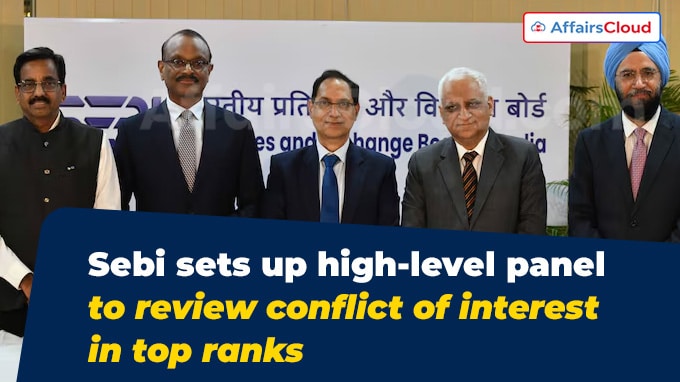 In March 2025, Mumbai (Maharashtra)-based market regulator, Securities Exchange Board of India (SEBI)has approved the setting up of a High-Level Committee (HLC) to review provisions related to governance and revamp its rules on conflict of interest and disclosure obligations for board members and senior officials.
In March 2025, Mumbai (Maharashtra)-based market regulator, Securities Exchange Board of India (SEBI)has approved the setting up of a High-Level Committee (HLC) to review provisions related to governance and revamp its rules on conflict of interest and disclosure obligations for board members and senior officials.
- This decision was taken during SEBI’s 1st meeting under its new chairperson of Tuhin Kanta Pandey.
Key Points:
i.The HLC is tasked to conduct comprehensive review of regulations governing property, investments, and liabilities of board members.
- This move aims to ensure high standards of transparency, accountability, and ethical conduct of members and officials of the board.
ii.The committee will comprise eminent persons with expertise and experience in areas such as: constitutional, statutory, regulatory bodies, public sector, private sector, among others.
- SEBI will announce the names of the committee members in due course.
Other Outcomes of the Board Meeting:
SEBI Approved to Double FPI Investment Threshold for Granular Disclosures to Rs 50,000 crore
SEBI has approved a proposal to double Foreign Portfolio Investors (FPI) investment threshold for granular beneficial ownership (BO) disclosures from existing Rs 25,000 crore to Rs 50,000 crore.
- With this, now FPI holding over Rs 50,000 crore of equity Assets Under Management (AUM) in the Indian markets will be required to make additional disclosures as laid out in the circular date August 24, 2023.
- At present, it is mandatory for certain FPIs with equity AUM of over Rs 25,000 crore to give granular details of all their investors or stakeholders on a look-through basis.
SEBI Eases Investment Rules for Category-2 AIFs, Allows Investments in Lower-rated Listed Debt
The Board of SEBI has eased investment restrictions for Category-II Alternative Funds (AIFs) including private equity and debt funds, enabling them to invest in listed debt securities rated ‘A’ or below. Now, such investments will be considered equivalent to investments in unlisted securities for regulatory compliance.
- At present, Category-II AIFs are required to invest minimum 50% of their funds in unlisted securities, poses higher risks but at the same yield higher returns.
- However, latest amendments to SEBI Listing Obligations and Disclosure Requirements (LODR) 2015 regulations have significantly reduced the availability of unlisted debt securities, limiting investment options for these funds.
SEBI Introduced Key Changes Regarding Appointment, Cooling-off Period for MII Key Officials
SEBI has introduced key changes regarding the appointment of Public Interest Directors (PIDs) and cooling-off period for key management personnel (KMP) and directors for Market Infrastructure Institutions (MIIs).
- It has clarified that earlier process of appointment of PIDs, which requires the approval of SEBI but not shareholder will continue.
Key Changes:
i.However, SEBI will no longer prescribe a cooling-off period for KMPs instead of that, the governing board of MII has been entrusted with responsibility to do the same.
ii.Also, it will be mandatory for now to get approval from the board of MII for the appointment of other key officials such as: compliance officer (CO), chief risk officer (CRO), and chief technology officer (CTO), instead of the Nomination and Remuneration Committee (NRC).
iii.If the governing board of MII did not reappoint a PID after his 1st term expires, the reasons for that must be recorded and communicated to SEBI.
Other Key Decisions:
i.SEBI has now allowed Investment Advisors (IAs) and Research Analysts (RAs) to charge advance fees for maximum period of 1 year. This move aims to offer more flexibility in fee structuring.
- Previously, IAs and RAs were allowed to charge fees for up to two quarters and one quarter respectively.
iv.SEBI has proposed key measures on risk monitoring and open interest formulation in Futures & Options (F&O) amid volatility. It has suggested changes in the calculation of Open Interest (OI), the extent of outstanding positions in F&O; and Market Wide Position Limit (MWPL), which is the maximum number of positions allowed in stock derivatives.
- Some of the key reforms suggested are: limiting the number of weekly expires to one per exchange, increasing the contract size, upfront collection of premium and removal of calendar spread benefits on expiry day.
Recent Related News:
In February 2025, SEBI launched a new digital platform, Mutual Fund Investment Tracing and Retrieval Assistant (MITRA). The new platform is designed to help investors in tracking and reclaiming inactive or unclaimed Mutual Fund (MF) folios.
- The platform will assist with the investments that may have been forgotten, lost or left unclaimed due to outdated Know Your Customer (KYC) details or the demise of original investor.




